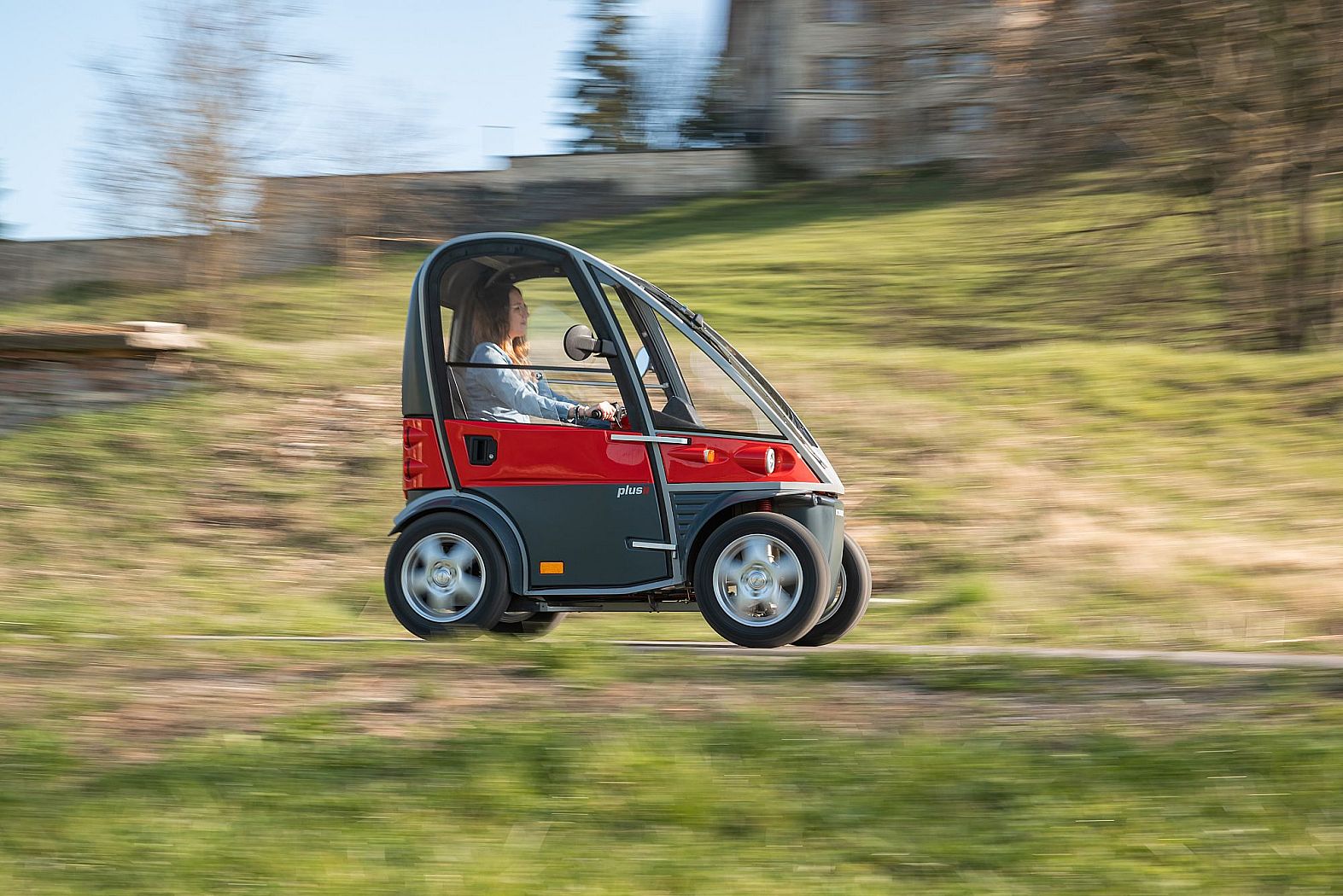Electric cars are not THE solution.
I’ve been saying this for a while. Not only that, but electric cars are substantially heavier than their ICE-powered equivalents, meaning both tires and roads wear out more quickly. Plus, there’s a ton of pollution and other environmental damage caused by battery production that at least partly offsets the lack of tailpipe emissions.
As loathe as I am to admit, because I’m a car enthusiast and I enjoy driving, cars cannot be the default mode of transportation everywhere indefinitely; they will always need to exist, but should mostly be for small centres with no capacity to implement transit infrastructure and last mile type of things.
Plus, there’s a ton of pollution and other environmental damage caused by battery production that at least partly offsets the lack of tailpipe emissions.
The battery production pollution is an issue, however one thing to keep in mind is that once the minerals are out of the ground they can be recycled, unlike drilling for oil. When looked at on a long timeline the battery for an electric vehicle is a lot cleaner than everything needed to power an ICE vehicle.
That said, there’s always room for improvement and we should never get complacent. But we don’t avoid innovation just because it isn’t perfect.
It’s not just tailpipe emissions, though - there’s an entire supply chain of extraction, shipping, refining, delivery that’s needed to get fuel to your local gas station.
The fossil fuel industry always wants to compare the total environmental damage of an EV with just what comes out of the tailpipe of an internal combustion vehicle. Don’t fall for it.
This should be the definition of ‘letting perfect be the enemy of good’ Please stop using false oil lobby talking points to attack the transition to electric cars. Electric cars are an order of magnitude better for the environment than petrol/diesel, stop fighting big oils battle for them. Now let’s talk about how we can reduce road journeys through public transport, and reduce environmental impact of tires.
Is that true about the tires though? Electric car tires are designed to be substantially tougher because of the increase in weight, do they actually shed more material?
There’s no such thing as an “electric car tire.” They just use standard passenger vehicle tires rated for the appropriate weight class.
“Tougher” just means they handle more weight by holding higher air pressure, so they’ll have more layers of steel, kevlar, canvas, etc. The materials that makes contact with the road still wear the same.
There is in fact such a thing as an “electric car tire”.
Fundamentally you are correct that they are in essence just tires rated for the weight class, but there’s more to it than just that.
Electric car tires are usually made with a stiffer rubber than comparable combustion cars, this is mostly to handle the additional weight, but they also stagger the tread pattern, and some have foam inside them, both to improve the noise and acoustics of them. Something that wasn’t a problem when there were a noisy combustion engine running. But in an electric car you don’t have the engine noise, and therefore hear a lot more of the wheel noise.
None of this help with the particle emissions, but there is in fact such a thing as an electric car tire.
Engineering Explained has a great video if you are curious: https://youtu.be/8pM9o2Ifcro
This is what I’d read, this guy specifically states that the tires are much stiffer to counteract the increased wear of a regular tire from the 20-30% increase in car weight. Anyone know of any good studies on this?
You can’t really engineer away the need for friction, and if there’s friction there is going to be wear.
If EV tires were much better than normal tires with the same grip levels and somehow magically less wear, all tires would adopt that technology.
Not that I’m a materials scientist, but EV tires don’t seem much different than other “economy” tires, other than a higher load rating.
There is actually a lot of small details that make EV tires different than regular tires. Nothing that helps with particle emissions, though:
All the EVs I see sold around where I live (Norway) come with the same eco tires as ICE cars. The heavier ones like a Tesla Model X just comes with the same tires rated for higher load. (And the extra foam inside for sound dampening, but that’s an option for most tires) The Model X also happens to be delivered with the same tire they put on the very much not EV Ford Explorer.
I know nothing about the tires on the Teslas or the non EV ford explorer, or even what tires are fitted in Norway. But the Hyundai Ioniq 5 I bought in Denmark last year came fitted with Michelin Primacy 4 tires, which are indeed EV tires.
What makes it EV and not just an eco tire? On Michelins website (Norwegian one) and various tire shop websites it just, an eco tire.
The staggered tread pattern, the stiffer rubber, the profile of the tire, and the sound dampening foam inside the tire. There’s nothing stopping you from mounting these on regular ICE cars though.
Here’s a video explaining more about EV tires:
You have answered your own question. They are built to be tougher, by using more material.
They still shed a proportional amount of material for the vehicle weight.
Not only that but if they get damaged due to trauma prior to end-of-life (such as a puncture of pothole damage) that is a lot more material that is going to landfill (or tyre “recycling” in countries that have it).
They use the same materials, they’re usually just thicker. If you get one of those heavy boat luxury cars you’ll put the same tires on them. They shed material at a faster rate, but they have more material to compensate.
Good thing DOGE and the rest of the Trump fueled Republicans are foaming at the mouth to completely eliminate federal funding for the California high speed rail project. Thank God they’re going to save us from affordable transportation for the masses in favor of continuing to murder the planet actively by distributing microplastics into every square millimeter of the Earth.
If we had those flying cars we were promised, this wouldn’t be an issue.
Given how terrible humans are at driving, I think flying cars are a horrible idea.
Self-flying AI cars! Think about possibilities! 🫰🏾
I think it’s only a matter of time until we get there with drones.
Not the military kind…the ones with four rotors that can already pilot a course and land themselves when batteries run low.
In a few densely populated cities in the richest countries where flying regulations aren’t really strict, maaaybe. In general I don’t think so.
Those supposed to be at the Olympics but they had to push it back because timeframe. (A couple successful flights but not enough to make guarantees I believe)
I’m looking forward to all the noise pollution. Drones, drones everywhere
Compared to now: car tyre roar everywhere. It might be better to have a drone taxi go straight up and away from people.
They’re testing them out on the East Coast, won’t be long now.
Source?
Probably referring to the large drones that have been seen in NJ, followed by NY and PA since November.
FBI is looking into them, its… Odd.
Some links to recent articles/Wikipedia:
https://en.m.wikipedia.org/wiki/2024_New_Jersey_drone_sightings
https://apnews.com/article/fbi-drones-sightings-central-new-jersey-cd8866c9c2568216759007716990decf
Right?! They really over promised the future. I want my money back.
mention of 9/11
Smaller 9/11s would be happening every day if flying cars were common
Also helicopters already exist and they’re basically flying cars
What I’m envisioning isn’t piloted by the passengers. Set your destination and it navigates following FAA rules and routes over short distances.
It’s pretty trivial to detect humans and scan faces. Until things improve r these are going to be single passenger only so not much opportunity for a large payload.
With self driving cars, it’s only a matter of time before someone makes a self driving car into a delivery system for a bomb.
Yet another example of how pretty much every problem is, at its heart, a zoning problem:
- Microplastics? Too much driving, because trip origins and destinations are too far apart to be walkable.
- Greenhouse gas emissions from cars? Too much driving because not enough walkability.
- Greenhouse gas emissions from housing? Poor efficiency because too many single-family homes exposed on all sides instead of high-density housing with shared walls.
- Greenhouse gas emissions from concrete production? Using way more of it than we really need to build huge amounts of unnecessary parking (and much wider streets than we’d need for bikes + transit + only delivery vehicles).
- High housing prices? Not enough housing density.
- Obesity? Sedentary lifestyles, i.e., not enough gym of life.
- Racism? Redlining.
- Wealth inequality? (Among other things), protecting rich landowners from market forces by eliminating competition from multifamily developers that would build out the land to its highest and best use.
See also, this video: The Housing Crisis is the Everything Crisis. He almost gets it, but fails to connect that very last dot, which is that the housing crisis is itself caused by bad, density-restricting zoning!
<sarcasm> but if more people were walking, they would all be run over by tiny men in Dodge Ram250s</sarcasm>
Removed by mod
You’re not entitled to choose otherwise unless you’re actually willing to pay for it. Zoning laws that force an oversupply of single-family homes are effectively a subsidy of that lifestyle, and it’s high fuckin’ time for that subsidy to end!
In other words, if you own a house in the suburbs, you might think you’re a rugged individualist who bought at fair market value, but you’re actually a damn welfare queen and don’t even realize it.
Removed by mod
We just need to swap all roads out with big orange hot wheels tracks. I don’t know if it’d solve the problem but at least it’s a suggestion and it’d be sick as hell.
Omg can you imagine? Instead of traffic lights we’d have boosters throwing us into loop de loops 😍
Can I yell vrrrrrrrooooommmmmmmm on the loops?
Better than what people are yelling on the road these days, at least.
The solution is fewer and lighter vehicles. Everyone purchasing oversized EVs is the exact opposite of the solution.
Mass Transit (trains and light rail) Pushbikes, e-bikes, Subcompact, and micro/Kei cars are the answer.
Let’s bring back post world war 2 motorbikes, affordable, reliable, unbeatable.
Polluting, inefficient, unsafe, noisy.
If you go to South East Asian countries where the main form of transport is post WW2 motorbikes, you will notice that they aren’t the safest or most comfortable places to live.
If you have a western budget, however, you can transcend the day-to-day hazards and live in a resort for a pittance.
Polluting - I don’t think so, except they’re 2 stroke engines, which are rare, nowadays. These days you see even more and more electric bikes.
Inefficient - People often go 2, 3, 4 people on a bike that uses maybe 3 l/100km (78 MPG) or pull trailers wich stuff loaded, while using less space than a car.
Unsafe - totally less safe for the people on the vehicle. I don’t know about pedestrians. However, a lot of the accidents happen, because poor education to get the license, if any; hardly any law enforcement and poor vehicle maintenance.
Noisy - not more than a ICE car. Some motorbikes here have broken exhausts, which make them noisy, but that again is a lacking law enforcement and maintenance issue.
I am aware, however, that driving 2 wheel vehicles in ice and snow is not a wise idea, so while it works in SEA, it would be different in colder climates.
Maybe where you live 2 strokes are rare, but when we are talking cheap, it’s always 2 stroke. Especially the example the other person gave, Asia is full of 2 stroke engines, all super noisy and poluting. Living near a dense traffic street in Asia is a very interesting form of torture for anyone who enjoys clean air or peace and quiet.
Hell, even where I live, they are mildly popular and very hard to miss when one goes by. To move to clean and quiet alternatives can’t come soon enough.
Thank goodness that cheap e-bike motors and solar panels are available to these markets.
Someone with a little bit of intelligence can retrofit an e-bike motor on a pushbike, put some solar panels on their roof, connected to some trusty Lead-Acid batteries in their hovel and they can recharge their e-bike or cargo-bike.
Cheap is a very relative term and I doubt you can reach an equivalent gas powered two stroke on the same budget.
In Asia they use these vehicles as their main mode of transportation, meaning they also need to have power, travel far and carry their family or shopping. Where I live people use these vehicles on the highway and e-bikes have legal restrictions and documentation. Good luck reaching the minimum required speed with an unlicensed self built ebike.

Kyburz Plus
I had one of these when I was 3, it was chock full of microplastics
Love it.
Removed by mod
There is no alternative suggested. The purpose of this movement is to tax heavy EVs. I think that makes it distraction.
The smaller the EV the more range per kwh, and so smaller batteries are needed which makes them more affordable. It is not unreasonable to tax heavy vehicles, but the punch line that motivates this piece is “EV’s bad”. They could have recommended micromobility for example.
imho we should tax any vehicle that puts an inordinate strain on the roads. ultra-heavy EV’s like cybertrucks and hummers are ridiculous and inefficient, and the purchases knew it when they bought them.
but also the cummins diesel powered pavement princess my colleague drives BY THEMSELVES TO THEIR OFFICE JOB day after day, I think that should have to pay an excise tax.
work vehicles certainly deserve cutouts, but they need to be work appropriate vehicles, not just jacked up asshole haulers.
work vehicles certainly deserve cutouts
That thinking is what got us SUVs. Work vehicles earn income, and so probably don’t need cutouts.
It would be funny though if some environmentalist managed to make the tax properly technology agnostic though. Mostly if you can keep them from being exempted anything that hurts EVs goes double for pickups.
Of course we both know gas cars get exempted whenever this sort of thing passes because it’s never actually about vehicle weight and road wear so much as how can we slow the decline in gasoline demand for a few years, but it’s nice to imagine that silver lining.
Electric cars are not THE solution.
This is why I raised the topic of airless tires a while back. They’re not the solution, but they last longer than traditional tires. Initially they were rated to last a lifetime, but that’s not profitable so they put an end to that.
That does not address the issue at all. The problem is that tires wear, and the particles of tire rubber that are shed are the microplastics.
A tire that lasts a lifetime would shed less particles than
one that needs replacing every so many milesall the tires used in the same timeframe, would it not?Here’s the problem with tires.
If you want long treadwear, you use harder material. But then you get worse traction.
If you want good traction, you use softer material. But then you get worse treadwear.
If you want a car to perform safely on public roads, its tires necessarily need to wear away as they are used. Electric vehicles are presently even worse on tires, as they weigh so much more than ICE vehicles.
The reason tires need replacing is because they’re relatively thin. Airless tires aren’t wear-less tires.
Not to mention that airless tires make for a horrible ride.
Actually earlier prototypes were wear-less, from both companies that were developing them.
As for the horrible ride, from what I’ve seen, that’s not a problem. But even if it was perhaps that should be solved by other aspects of the car.
There is, fundamentally, one measurement that defines everything about the performance characteristics of a car: the amount of force it can impart on the road (and vice versa). This single measure defines its limits of acceleration, turning and braking. And what determines how much of that force is available?
The tires, and the coefficient of friction of the rubber compound they’re made of, which is directly related to how quickly they wear. Every possible solution that makes tires wear less will also make cars perform worse.
…Well, short of drastically reducing weight (i.e. making a bicycle instead of a car).
…Or swapping them out for steel and running the thing on rails (i.e. making a train instead of a car).
They’re not prototypes, they exist and they’re called tweels. They’re only really useful for low-speed industrial equipment where ride quality is a low priority.
The amount of time a tire lasts ultimately has fuck-all to do with whether it’s airless or penumatic; it has to do with how much traction it provides and how large/heavy a vehicle it’s supporting. Any tire that is good at its job of providing traction to a big, heavy vehicle like an automobile (and SUVs / EVs / EV SUVs only make this worse) is going to pollute a fuck-ton compared to, say, a bicycle tire or the steel wheel on rail public transit.
Not if the way it lasts a lifetime is by being made of the same material that wears off but being made of more of it. 🤷♂️
Rubber+friction=micro plastics
I ride motorcycles and tires have always been a major issue with riders because of cost. Bike tires wear out fast even though it’s a lighter vehicle and tends to put on less mileage.
The main culprit that most industry insiders have suggested is that motorcycle tires are purposely designed to not last as long because its so easy to market crappy tires to the vast majority of riders. All you need is have marketing campaign of racers and racing tires and then stamp the name on a tire and sell it to young guys who want to ride as fast as possible … they’ll pay hundreds year after year for tires that only last one season but supposedly give them great performance.
I ride moderately on a 1998 BMW K1200, a fast sport touring bike and I put on moderate mileage every summer … I’m not a long distance rider … yet I have to change my tires just about every year.
Fortnine, a Youtube channel dedicated to motorcycle riding did a great description of this …
The giveaway is that you could put a small car tire on a motorcycle and it would last ten times longer … whereas you place a motorcycle tire on a motorcycle tire and it will last for a far shorter time.
Motorcycle tires are designed to not last as long … fast riders can argue that better tires do not last as long and I agree with them … but for moderate riders or just Sunday riders with low mileage, there is no need to have motorcycle tires last for such a short period of time. It’s all meant to sell as many tires as possible for no reason other than to make someone money.
The trouble is that motorcycles are generally way higher-performance than cars (in terms of e.g. HP/weight ratio), so putting low-friction, long-lasting tires on them is irresponsible. It’d be like putting Prius tires on a Lamborghini: sure, you could drive the thing responsibly and within the performance limits of the tire, but it’s missing the point of the vehicle.
Now, if more motorcycles were built sensibly – with much less horsepower – then I’d expect the tires to last a decent amount of time. For example, do 49cc scooters have the tire wear problem you’re complaining about? I’m willing to bet the answer is “no.”
This is where the debate constantly diverges to extremes … either have sensible long lasting tires … or high performance racing tires … but nothing moderate in between.
Manufacturers are more than able to produce a reasonable motorcycle tire that would have enough performance and would last far longer. There just isn’t any incentive to do it. It makes them far more money to make tires that don’t last as long and at this point, I think everyone knows that, we are just not able to do anything about it.
Like my 1998 BMW … it’s an ancient machine at this point and it was originally a performance bike when it was new and would have benefited from a high performance tire … but its 26 years old and I really don’t trust it to go fast any more but I love the look of the bike and I enjoy riding it. I maintain and service it myself but there are far too many old parts on it that there will inevitably something that will fail and I really don’t want that to happen at speed. All I need is a good decent tire, not a tire that is meant for the race track for a modern newer bike.
Like my 1998 BMW … it’s an ancient machine at this point and it was originally a performance bike when it was new and would have benefited from a high performance tire … but its 26 years old and I really don’t trust it to go fast any more
I guarantee your '98 BMW is still way faster than my '90 Miata, and even that is still a sports car that still deserves and requires decent tires. Therefore, yours still does too.
I wasn’t being hyperbolic when I used 49cc scooters as an example – I really do think that’s pretty close to the limit of how much power a motorcycle can have and still reasonably use long-wearing, not-very-grippy tires.
Is it not because they have so little contact area compared to passenger vehicle tires?
The contact area compared to the weight ratio is not that different from any other vehicle … a bike weighs less so it has less contact … a car weighs more and so needs more contact with the road … a truck weighs a lot and needs even more contact with the road.
The end result is always the same … the technology is there to make a motorcycle tire last far longer and the same with car tires … the problem is is that there is no financial incentive to make a long lasting tire that would be better for the environment.
I know motorcycle tires need replacing fairly frequently, but I had no idea it was a racket. Although, I’d think they’d generally need to be softer for maximum traction on two wheels.
The whole traction debate only makes sense if you start getting into racing speeds and riding on a fast race track. For the average rider, we’re only riding at normal highway speed (at least we are supposed to) and guys like me like our riding lifestyle enough to never get into crazy speeds because we baby our bikes, we don’t want to create any more variables to put our lives at risk and we’re cheap and don’t want to wear out our tires.
If I knew of a manufacturer that produced a cheap $100 tire that could last four or five season of my light moderate riding … it would be the only tire I would buy. But there are so many manufacturers, types, subtypes, models, years, design, material of tires out there that’s it’s a constant science to try to figure out what is real and what isn’t. I usually don’t have the time to research it all nor do I have the resources that I just end up buying the same Metzeler tires because I don’t want to order the wrong tire and I definitely don’t want to install the wrong tire either.
Tires are a part of life. We can make small changes until we improve public transport infrastructure across the world or we can continue as we have done and drive this planet to extinction.
Tires are not “a part of life!” Humanity did just fine without them until not much more than a century ago, despite not having much public transit back then, either.
You know what the real difference, and the real solution today is? Walkable, dense zoning.
I would love to force everyone to walk their kids to school, but things are fucked. Sadly it takes a while to teach us to unlearn things. Even iny borough in London, they’re dragging their heels on licensing ebikes and that hurts everyone.
For those who didn’t read the article or aren’t following EU politics, Euro 7, passed in April, explicitly addresses the need for reining in pollution from brakes and tires. Some more information here:
The position adopted by the European Parliament improves the European Commission’s proposal by extending the scope of tyre abrasion limits to all tyres and not just those fitted on Euro 7 vehicles. It also directly links Euro 7 to the work that is being done in the UNECE World Forum for Harmonization of Vehicle Regulations (WP. 29), which will set global rules regarding a test method and limits for tyre abrasion.
There’s a new Euro standard “major version” every 5.8 years on average, so here’s hoping that my outdoor furniture will soon not become completely blackened within a year after the last cleaning.
whatever happened to the green tire technologies that get announced by the big mfg and then never come to market… like the mushroom based materials
Usually stuff like that is just a distraction so companies can do greenwashing while delaying the implementation of real solutions. I’m going to guess that’s the case but, I haven’t really looked into it.
fuckcars
Ban tires!
The American auto industry
Lobbyists
Conservatives
The existence of hundreds of thousands of miles of asphalt paid for by the American taxpayer
Oh, right. Well, I’ll just wave my finger once a year and… die, eventually.
The other day I was wondering how miraculous tires are - fucking balloons lifting the heaviest vehicles on land.
Who ever said electric cars were the solution?
Helping one problem and not helping them all means it’s better to do nothing according to a lot of people. If you are anti cars that’s one thing, but to specifically aim it at EVs is clearly just targeted propaganda as always.
Yes we put 100 years of research into gas powered cars, 15 years of research (or less by most companies) and the weight isn’t the same yet so they want to toss all advantages of moving to them.
Look at things like the Telos Truck. 4,400 pounds, 4 doors, small and can fit a 8’x4’ sheet of plywood if needed in the bed.
Length of a mini Cooper, so it fits in smaller parking spots, weighs less than the average ICE truck, costs less than the average ICE truck and will have less impact on tires people worry about here, while not shipping oil across oceans and causing cancer to the people in the vicinity.
A lot of people think that. The solution to car pollution is less cars and more forms of transport. It’s trains. I like trains.
Binary view is a poor one. EVs have a lot of benefits and also some drawbacks. As everything in the world, they are not perfect. The trick is that they have much more benefits than drawbacks.
We need a clever solution to this problem, because our govts are unlikely to solve this through new infrastructure or policy changes.
I’ve been reading about this topic for a while now, and I always thought the tech these guys invented was worth further investment: https://smarttirecompany.com/
Less rubber is good but we really need a rubber replacement that is biodegradable.
Nickel alloys are expensive and require some nasty mining so shape memory tires are a stopgap solution at best.
Material sciences is a difficult field. People spend years researching one small area just to shelve their research as not viable, too cost prohibitive, or impractical for large scale manufacturing.
I haven’t seen any research into durable biodegradable materials that could hold the weight of vehicles unfortunately, so I think investment will be hard to come by. Though I don’t disagree with the premise that something that can degrade over time, but also not harm the environment would be an ideal solution to the problem. I imagine if such a thing were created it would be able to be applied to many other industries, not just transportation.
Michelin and Bridgestone have shown off proof of concept biodegradable tires but nothing to the market yet. It is possible, and will take incremental progress as you say. I’d like to see more work and updates on this.















